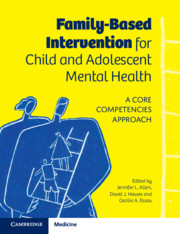Book contents
- Family-Based Intervention for Child and Adolescent Mental Health
- Family-Based Intervention for Child and Adolescent Mental Health
- Copyright page
- Contents
- Contributors
- Preface
- Part I Theoretical Perspectives on Family-Based Intervention
- Part II Core Clinical Competencies
- Chapter 5 Engaging Fathers in Family-Based Interventions for Child Mental Health
- Chapter 6 Cultural Diversity and Family-Based Interventions
- Chapter 7 Delivering Family-Based Interventions Using Phone-Assisted and Internet-Based Technology
- Part III Family Intervention for Specific Child and Adolescent Mental Health Problems
- Part IV Family Intervention for Children at Risk Due to Family Dysfunction or Past Adversity
- Part V New Developments in Family-Based Intervention
- Index
- References
Chapter 6 - Cultural Diversity and Family-Based Interventions
from Part II - Core Clinical Competencies
Published online by Cambridge University Press: 18 February 2021
- Family-Based Intervention for Child and Adolescent Mental Health
- Family-Based Intervention for Child and Adolescent Mental Health
- Copyright page
- Contents
- Contributors
- Preface
- Part I Theoretical Perspectives on Family-Based Intervention
- Part II Core Clinical Competencies
- Chapter 5 Engaging Fathers in Family-Based Interventions for Child Mental Health
- Chapter 6 Cultural Diversity and Family-Based Interventions
- Chapter 7 Delivering Family-Based Interventions Using Phone-Assisted and Internet-Based Technology
- Part III Family Intervention for Specific Child and Adolescent Mental Health Problems
- Part IV Family Intervention for Children at Risk Due to Family Dysfunction or Past Adversity
- Part V New Developments in Family-Based Intervention
- Index
- References
Summary
Family interventions are critical in addressing many of the risks and issues of children and adolescents. However, a key factor in ensuring their effectiveness is understanding the context in which they are needed. This chapter describes the role of culture in shaping the acceptance of and access to family interventions. It focuses on how culture can influence the recognition of problems, access to information, openness to help-seeking, social support and acceptance of providers and interventions. It also discusses critical factors to enable community engagement with diverse ethnic and cultural groups, including information sharing, referral pathways, building social support, cultural adaptation, building trust relationships and cross-cultural competence, harnessing resources and using multi-disciplinal teams.
- Type
- Chapter
- Information
- Family-Based Intervention for Child and Adolescent Mental HealthA Core Competencies Approach, pp. 67 - 75Publisher: Cambridge University PressPrint publication year: 2021
References
- 1
- Cited by

